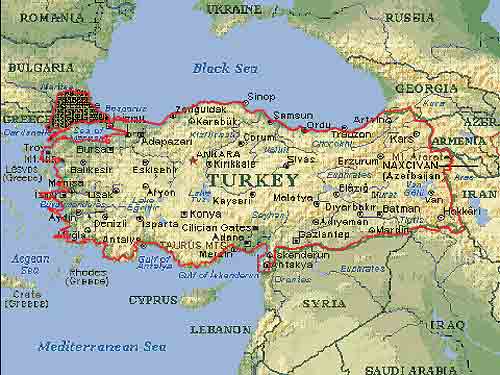The European Commission has recommended "opening talks" on the admission of Turkey to the European Union-but Ankara must yet meet stiff conditions. The final decision on opening talks with Turkey rests with the leaders of all 25 EU member states in December, with ultimate accession years away. Even if full membership negotiations were to start soon, Turkey would not be able to join until sometime in the next decade. Nevertheless, the Commission's recommendation is regarded as a major milestone in an impassioned debate.
The European Commission also confirmed that Bulgaria and Romania were still on track to join the EU in 2007, with negotiations to start with Croatia next year.
Climaxing 85 years of revolutionary changes in all aspects of their culture, demonstrating their ambitions to be "part of the West," the Turkish government has pursued a large number of economic and political reforms over the past several years. But the Commission has expressed continuing concern over human rights, religious discrimination, and violence against women, among other things.
Turkish Prime Minister Recep Tayyip Erdogen said, "Turkey has done its task. Now the EU must do its task. They're the ones being tested now. If we don't want a clash of civilizations, but to succeed at reconciliation, Turkey must take its place in the EU."
Opposition to Turkey's entrance into the EU centers on Turkey's size, its relative poverty, and the fact that it is Muslim.
Islam, meanwhile, is becoming a significant part of the cultural and political landscape of Europe. With 15 million Muslims living throughout Europe today, Islam has become the largest religious minority. In view of the current population trends and the need for immigrant labor, it is apparent that the number of Muslims in Europe will continue to grow exponentially. If Turkey is admitted to the EU, it would bring its population of over 63 million Muslims, raising the Islamic percentage from 3% to almost 20%.
(It is significant to note that the Vatican has also embraced Islam in its quest for leadership in the movement toward "ecumenicalism."1)
 Presently, Turkey also forms a welcome stabilizing buffer between Europe and the Middle East countries of Syria, Iraq, and Iran .
Presently, Turkey also forms a welcome stabilizing buffer between Europe and the Middle East countries of Syria, Iraq, and Iran .
Historical Background
During the Roman Empire, this region was the Roman Province known as "Asia Minor." It was the scene of Paul's missionary journeys as he established-and revisited-the many churches in Galatia, Phrygia, and Mysia. It was also the location of the seven churches of Revelation 2 and 3.
When the Muslims ultimately overran the eastern remains of the Roman Empire-and Constantinople became Istanbul-this became the Ottoman Empire which reigned over southeast Europe, North Africa, and the Middle East for over 600 years, until World War I dismantled it, and it was replaced by the Turkish Republic in 1922.
The Ataturk Legacy
In the years following World War I, Kemal Ataturk aggressively transformed Turkey from a theocratic autocracy into a Western-oriented democracy. In 1922 he abolished the Sultanate. In 1924 he abolished the Caliphate and the religious courts. In 1925 he made it illegal to wear the fez (which he regarded as a symbol of backwardness). Having rid Turkey of what he regarded as the trappings of Islamic backwardness, Ataturk proceeded to adopt Western ways. In 1925 Turkey adopted the Western calendar; in 1926 it adopted the Swiss civil code (and later the Italian penal code). In 1928 Turkey became secular: the clause retaining Islam as the state religion was removed from their constitution. Also, in 1928 the country switched to the Latin alphabet; in 1931, the metric system; in 1934 all Turks were obliged to take a surname (Mustafa Kemal became Kemal Ataturk), and women were given the vote.
Even after Ataturk died in 1938, the aspirations continued. Following World War II, Turkey joined all the main Western institutions: the UN in 1945; the IMF in 1947; the OECD in 1948; the Council of Europe in 1949; and, NATO in 1951.
Left in the Hallway
In 1963, after four years of application, Turkey received associate membership in the European Community. A crisis began to loom as Turkey applied for full membership of the European Community on April 14, 1987.
Turkey's associate membership agreement of 1963 specifically held out full membership as an eventual goal and their application in 1987 was ahead of Austria, Finland, Sweden, and Norway (whose applications had been accepted and expedited). As the years wore on, it became manifestly clear that, despite their 85 years of aspiring to be "part of the West," they were not welcome.
The recent much-awaited report of the European Commission is being hailed as a milestone in setting the stage for formal talks to begin, albeit with stiff conditions and emphasized caveats to cloud any premature enthusiasm.
Even if the EU's officials and politicians say "Yes," the people may say "No." France has announced that it wants to hold a referendum, eventually, on whether Turkey should be allowed to join. At the moment popular support in France-as with some other countries-appears weak.
Quo Vadis, Turkey?
We monitor these affairs because of their apparent relevance to the fabled Magog Invasion prophesied in Ezekiel 38 and 39: Meshech and Tubal were key cities in ancient Anatolia, which comprised the eastern 2/3 of present-day Turkey. If Turkey continues to be rejected by the EU, it will deem its destiny eastward to Eurasia and the Islamic Middle East. This would seem to set the stage for the events of Ezekiel 38.2
Alternatively, if Turkey is admitted to the EU, it may signal a strategic direction of further additions: the neighboring states of Syria and Iraq make up the ancient region of Assyria, which was also part of the eastern leg of the Roman Empire. (In fact, the Coming World Leader, commonly called the Antichrist, may come from Assyria rather than Western Europe.)
Notes:
- See our briefing package, The Kingdom of Blood, or Dave Hunt's excellent work, The Woman Rides the Beast .
- Micah 5: 5,6; Isaiah 10, et al.





